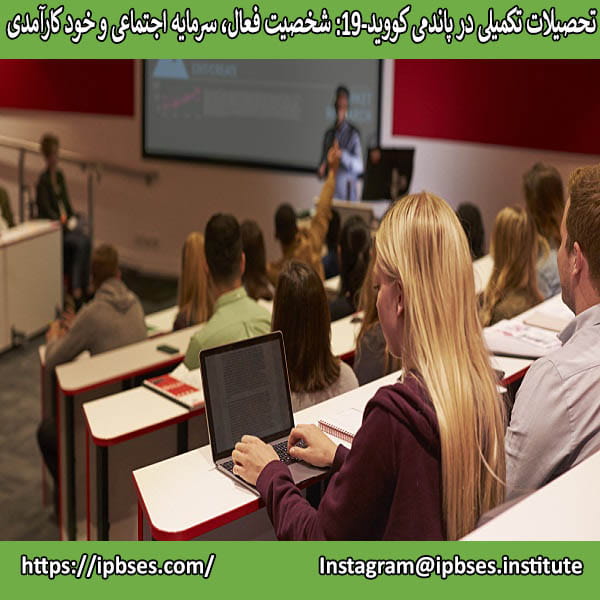پژوهشگران دانشگاه ساری انگلستان، دانشگاه ایالتی اورال جنوبی روسیه و دانشگاه بین المللی اسلام آباد پاکستان به بررسی نقش عوامل شخصیتی و روانی در آموزش آنلاین تحصیلات تکمیلی در پاندمی کووید-19 پرداختند.
روش پژوهش:
در این پژوهش پیمایشی آنلاین 332 داوطلب شامل دانشجویان مقاطع تحصیلات تکمیلی و مدرسان این دوره ها از 6 دانشگاه شهر اسلام آباد پاکستان شرکت نمودند. این پژوهش با فاصله 2 ماه مجدداً تکرار شد. پرسشنامه ها توسط google docs طراحی و برای داوطلبان ارسال شدند.
ابزارهای پژوهش شامل پرسشنامه شخصیت فعال (PPS)، پرسشنامه خود کارآمدی اینترنت، مقیاس حضور شناختی، مقیاس حمایت اجتماعی ادراکی، و مقیاس سرمایه اجتماعی الیسون مورد استفاده قرار گرفتند.
یافته ها:
- در پاندمی کووید-19، سطوح بالاتر شخصیت فعال در دانشجویان تحصیلات تکمیلی منجر به افزایش کیفیت تعامل آنلاین و خود کارآمدی در استفاده از اینترنت می شود.
- هرچه کیفیت تعامل آنلاین دانشجویان در دوره پاندمی کووید-19 بالاتر باشد، شخصیت فعال آنها بهتر می تواند منجر به افزایش سرمایه اجتماعی در ایشان شود.
- بالا بودن گرایش به رفتارهای سودمند سودمند اجتماعی، مشارکت اجتماعی، و احساس مسئولیت پذیری اجتماعی منجر به افزایش سطح سرمایه اجتماعی خواهد شد.
راهبردهای کارکردی:
- یکی از عوامل مهم در کاهش استرس های دوره پاندمی کووید-19، میزان تسلط و خود کارآمدی افراد در استفاده از اینترنت و توان برقراری تعاملات آنلاین است.
- هرچه عوامل شخصیتی برونگرایی و فعالیت اجتماعی در افراد نیرومندتر باشند، سازگاری آنها در دوره پاندمی کووید-19 بهتر خواهد بود.
- آموزش مهارت های روابط بین فردی از طریق فضای مجازی در کنار آموزش های پایه استفاده از قابلیت های فضای مجازی، عوامل بسیار مهمی برای افزایش سرمایه اجتماعی طی دوره پاندمی کووید-19 هستند.
The COVID 19 pandemic and digital higher education: Exploring the impact of proactive personality on social capital through internet self-efficacy and online interaction quality
Abstract
In the crisis of COVID-19, traditional learning suddenly changed to digital learning, which finally posed challenges to students and teachers. During the COVID-19 pandemic, the influence of personality factors on student social networks seems to be an overlooked area of research.
Aim
In this study, we aim to explore the relationship between proactive personality and social capital through underlying mechanisms (such as internet self-efficacy and online interaction quality), especially to obtain data during the peak of the COVID-19 pandemic.
Method
In addition, this study also aims to examine the moderating role of perceived social support in the association between proactive personality and Internet self-efficacy and the association between proactive personality and online interaction quality.
Similarly, the moderating influence of perceived social support also investigated the mediating effects of internet self-efficacy & online interaction quality.
This study used online survey tools to collect data from 332 respondents, including students and teachers from Islamabad, the federal capital of Pakistan.
Results and conclusion
In this study, we found that the proactive personality of students strengthened their social capital through online interaction quality during the COVID-19 pandemic.
Similarly, perceived social support strengthened the mediating effect of online interaction quality in the association between proactive personality and social capital during the COVID-19 pandemic.
Furthermore, the implications and future research directions are also discussed.
Keywords
Proactive personality, Internet self-efficacy, Online interaction quality, Perceived social support, Social capital, COVID-19 pandemic




